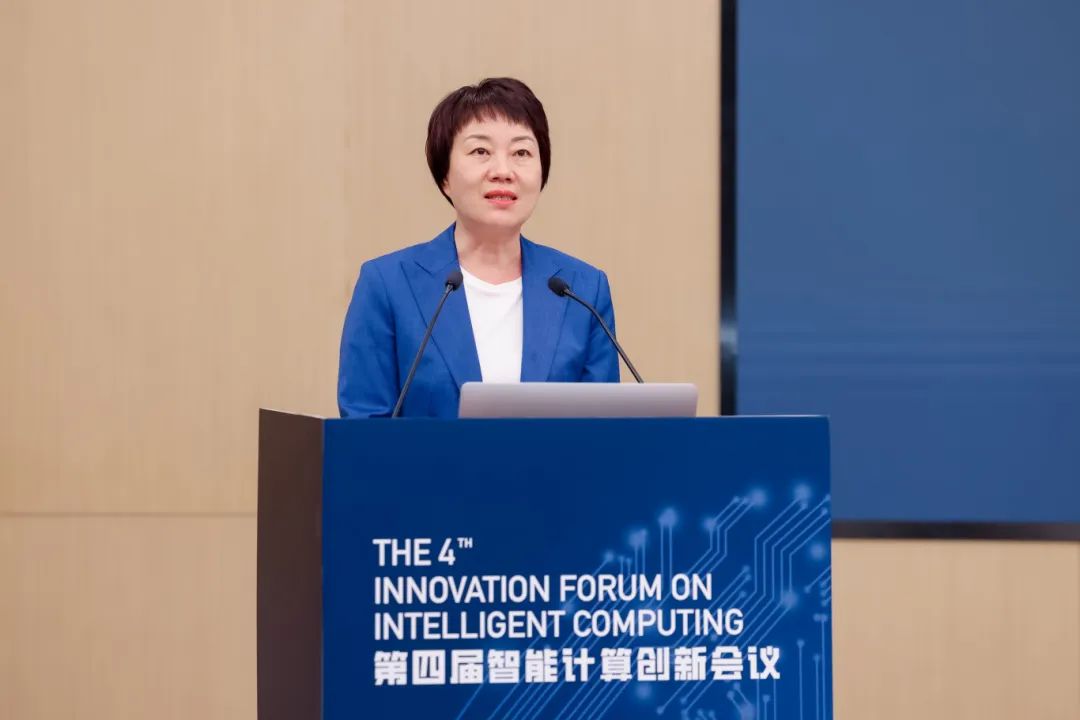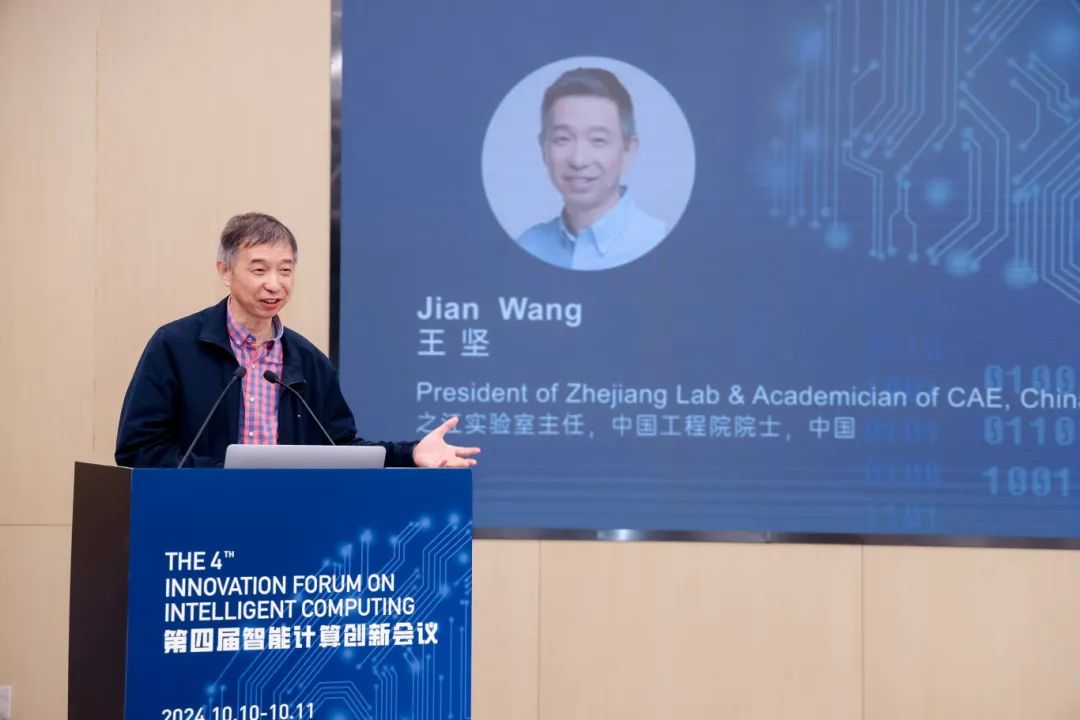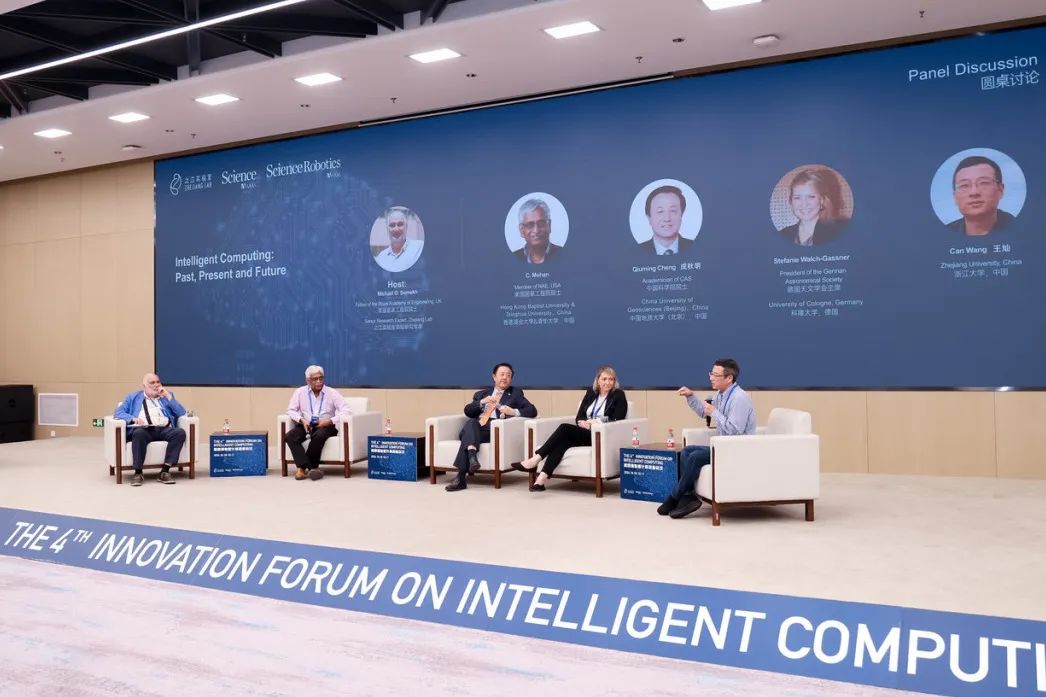

The 2024 Nobel Prizes in physics and chemistry being awarded to the use of artificial intelligence (AI) is undoubtedly the hottest event in science recently.
"AI's Penicillin and X-Ray Moment." On October 10, 2024, at the 4th Innovation Forum on Intelligent Computing co-sponsored by Zhejiang Lab (ZJ Lab) and Science/AAAS, WANG Jian, Academician of the Chinese Academy of Engineering (CAE) and President of ZJ Lab, quoted this report headline to describe this year's Nobel Prize. In this conference, scientists from China, the United States, Germany, Japan and other parts of the world in the field of intelligent computing, all happened to mention the Nobel Prize and exciting encounters it brought about. The forum has also ignited different sparks because of the "special case" at the Nobels.

What is the essence of intelligence? How does AI speed up scientific discoveries? What is the future of intelligent computing? During the two-day conference, top experts and scholars in different niche areas focused on computing issues and shared their research to inspire ideas, demonstrating the potentialities of intelligent computing.

"'Computing by Intelligence, Computing for Intelligence' is not only the theme of this forum, but also the core of ZJ Lab's research on intelligent computing. We earnestly expect that participants could make joint efforts to enrich the technical connotation of intelligent computing, foster international cooperation in intelligent computing, and facilitate the widespread adoption of intelligent computing, so as to contribute wisdom and strength to serving global development with AI, improving human wellbeing, and building a closer community with a shared future for mankind," TONG Guili, Secretary of the Party Committee of ZJ Lab, said in her opening speech.
Keywords: Data & Models
WANG Jian, Academician of CAE and President of ZJ Lab, delivered the first keynote speech at the event. From the first mention of AI by Alan Turing in a public lecture in 1947 to the emergence of AlphaGo, Transformer and ChatGPT, he reviewed the milestones in the history of AI and emphasized that "AI has a long history but only a short period of practical significance in its current form". "The history of AI really begins with the introduction of the Transformer architecture in 2017. It is only with this architecture that computational power can be harnessed."

WANG said that we have entered the era of the Third Paradigm that is "computing-intensive, data-driven and model-based", and AI can expand human creativity. Data is important, but computing helps researchers "calculate" models and also helps us rethink how to build models. This requires special attention to "scale". The superposition or integration of several elements is the key to developing AI. He took the geoscience model GeoGPT as an example to illustrate ZJ Lab's efforts on the Third Paradigm. He also stressed the importance of open science in particular. "Issues in science and technology can never be addressed by an organization alone. We need to open source our innovations and probe relevant cooperation mechanisms, enabling entities to work together for open science infrastructure."
In regards to data, C. Mohan, Member of United States National Academy of Engineering and Professor at Hong Kong Baptist University and Tsinghua University, shared his over 45 years of research and practical experience in databases, and introduced his recent work on data management concerning intelligent computing, including global data legislation and policy trends, integrated multimodal database management system, and deeper integration of AI and databases. He pointed out that core database systems are still being actively developed and flourishing, thanks to the combined efforts of organizations in academia and industry, and that advancements in database management systems provide support for intelligent computing efficiently and cost-effectively.
YE Yinyu, Professor at Stanford University, presented the latest research on generalized numeric algorithms for Linear Programming, Semidefinite Programming and LLM Training Optimization, showing the important role of these algorithms in hastening the resolution of specific problems.
Philip S. Yu, Professor at the University of Illinois at Chicago, presented geometric deep graph learning from the perspective of graph foundation models (GFMs). He proposed that representing graph data structures using different curved spaces is the way forward for GFMs.
Keyword: Intelligence
What is intelligence? MA Yi, Professor at the University of Hong Kong, started with the evolution of life and intelligence, and elaborated on the achievements in machine intelligence in the past decade. As data and compute technologies evolve, deep neural networks (DNNs) are becoming increasingly powerful. This poses a huge problem: nowadays, DNN-based AI systems are black boxes built on experience and trial-and-error process. The black boxes cannot be interpreted, secured or optimized, have no ability of continual learning, and even tend to be used to create fear. MA explained how to turn a black box into a white box from three aspects: "what to learn", "how to learn", and "learn correctly". He emphasized that we can understand intelligence by figuring out how to realize intelligence through computing. An intelligent system shall embrace mechanisms for self-correction and self-improvement of existing knowledge. Without such mechanisms, the system is not intelligent no matter how big it is.
ZHU Songchun, Professor at Tsinghua University and Peking University and President of Beijing Institute of General Artificial Intelligence, gave a speech with focus on TongTest, a benchmark and platform for testing AGI agents. He said that traditional AI tests face problems such as low task complexity, biases, lack of quantification, and lack of value testing. With reference to the Bayley Scales of Infant and Toddler Development, TongTest describes an ability- and value-oriented (i.e. U-V) AGI evaluation system that depicts three basic features of AGI and delineates five levels of TongTest milestones (Level 1-5), providing an important reference for AGI research and development path.
Keywords: AI for Science/Scientists
What has intelligent computing changed? E Weinan, Academician of the Chinese Academy of Sciences (CAS) and Professor at Peking University, reviewed some of the major advances made so far, starting with the origins of the "AI for Science" revolution. He said that we are undergoing a paradigm shift as AI will change the way research is done. For this purpose, we need to build an AI infrastructure that supports scientific research. E Weinan presented first-principles-based models/algorithms, new experimental tools and guidelines, and new literature/data/knowledge platforms, and proposed a new research model – the "Android model", aiming to build a big science platform encompassing theoretical tools, knowledge bases, AI-driven experimental facilities, and highly integrated computing systems, based on which problem-specific applications can be developed.
In the field of earth system science, it is a great challenge for scientists to elucidate the complex interactions among atmosphere, hydrosphere, geosphere and biosphere, understand the causes of and accurately predict extreme events, and study the long-term evolution of the Earth system. CHENG Qiuming, Academician of CAS and Professor at the China University of Geosciences (Beijing), presented the development from plate tectonics theory to earth system theory, and shared some data-driven geoscience research based on case studies, including singularity theory. He introduced the "Deep-Time Digital Earth" (DDE) program led by the International Union of Geological Sciences (IUGS), as well as the work on GeoGPT in which AI technology is used to transform the research paradigm in the field of geoscience, indicating that the integration of big data, foundation models and great computational power provides new opportunities for breakthroughs in earth system science.

Over the two days, all achievements in intelligent computing, including models, systems, algorithms, and applications, made an appearance at ZJ Lab. ZHOU Jingren, Chief Technology Officer of Alibaba Cloud, presented the experience, challenges and opportunities in building large language models (LLMs) based on business practices. LI Shengbo, Professor at Tsinghua University, shared his latest research on reinforcement learning-based autonomous driving. Jun Morimoto, Professor at Kyoto University and Head of the Brain-Robot Interface Department at ATR Computational Neuroscience Laboratories, proposed a hierarchical learning framework for motion learning of humanoid robots. LI Di, Professor at Tsinghua University, reviewed the major achievements in astronomy research in recent years, and introduced the Phased Array Feed Ultrawide Field-of-view Radio Telescope driven by intelligent computing. Stefanie Walch-Gassner, Professor at the University of Cologne and President of the German Astronomical Society, demonstrated high-resolution studies of molecular clouds. LUO Ali, a researcher at the National Astronomical Observatories of the Chinese Academy of Sciences and director of the LAMOST Operation and Development Center, described the research work based on the combination of multi-band survey data and multimodal AI. CHEN Guanhua, Professor at the University of Hong Kong, proposed two approaches to approximate the unknown exchange-correlation (XC) functional used within density-functional theory (DFT). A lively roundtable discussion centered on the past, present, and future of intelligent computing was held by C. Mohan, CHENG Qiuming, Stefanie Walch-Gassner, and WANG Can, Professor at Zhejiang University.
The two-day conference was so short yet so informative that it acts as a platform for communication among researchers in the field of intelligent computing, making it possible to deepen cooperation in the future. Adhering to the principle of "extensive consultation, joint contribution, shared benefits and common development", ZJ Lab will actively practice "open science", and work with its global colleagues to deepen international cooperation and exchanges in the field of intelligent computing, and create an intelligent computing innovation ecosystem.











